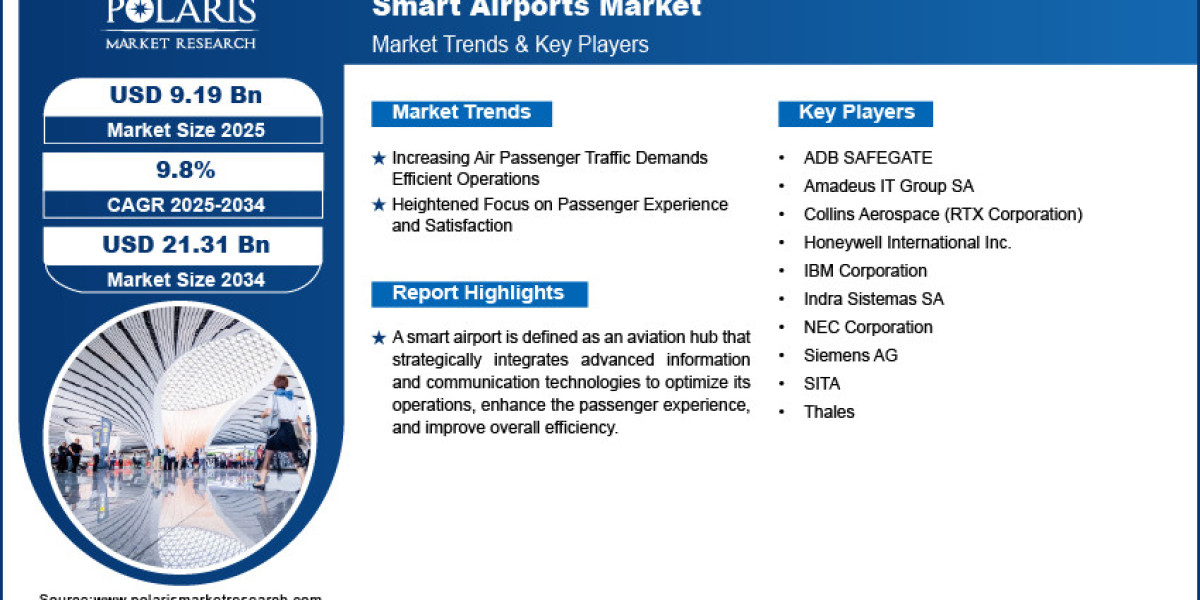The global smart airports market is experiencing a significant surge, driven by the integration of advanced technologies aimed at enhancing operational efficiency and passenger experience. As airports worldwide embrace digital transformation, the market is poised for substantial growth in the coming years.
The smart airports market size was valued at USD 8.39 billion in 2024. It is projected to grow from USD 9.19 billion in 2025 to USD 21.31 billion by 2034, exhibiting a CAGR of 9.8% during 2025–2034.
Market Overview
Smart airports leverage cutting-edge technologies such as artificial intelligence (AI), the Internet of Things (IoT), biometric authentication, and data analytics to streamline operations and improve passenger services. These innovations facilitate real-time decision-making, predictive maintenance, and personalized traveler experiences, marking a shift from traditional airport models to more connected and efficient systems.
The market's expansion is fueled by the increasing demand for seamless travel experiences, heightened security measures, and the need for efficient airport operations to accommodate growing passenger volumes. The adoption of smart technologies enables airports to optimize resource allocation, reduce operational costs, and enhance overall service quality.
Market Segmentation
By Application:
- AI/Machine Learning: Utilized for predictive analytics, passenger flow management, and operational efficiency.
- Data Visualization: Enhances decision-making through real-time dashboards and analytics.
- Anomaly Detection: Identifies irregular patterns for security and maintenance purposes.
- Cybersecurity: Protects critical infrastructure from cyber threats.
- Asset/Resource Management: Optimizes the utilization of airport resources and equipment.
By Platform:
- Hardware: Includes sensors, cameras, and biometric devices.
- Software: Encompasses applications for data analysis, passenger services, and operational management.
- Data Management: Involves the storage, processing, and analysis of vast amounts of airport data.
By Airport Model:
- Airport 1.0: Basic digital infrastructure with limited automation.
- Airport 2.0: Integration of digital systems for improved efficiency.
- Airport 3.0: Advanced automation and data-driven decision-making.
- Airport 4.0: Fully connected and intelligent systems with real-time responsiveness.
Regional Analysis
North America:
North America leads the smart airports market, attributed to early adoption of advanced technologies and significant investments in airport modernization. The United States, in particular, has implemented RFID-based baggage tracking, automated immigration systems, and mobile applications to enhance passenger experiences. The region's focus on improving operational efficiency and security continues to drive market growth.
Europe:
Europe holds a substantial share of the market, driven by extensive infrastructure upgrades and a commitment to sustainable airport operations. Countries like the United Kingdom and Germany are at the forefront, implementing AI-powered systems for resource planning and environmental monitoring. The region's emphasis on reducing carbon footprints aligns with the adoption of smart technologies.
Read More @ https://www.polarismarketresearch.com/industry-analysis/smart-airport-market
Asia-Pacific:
The Asia-Pacific region is experiencing rapid growth in the smart airports market, propelled by increasing air travel demand and significant investments in airport infrastructure. Countries such as China, India, and South Korea are embracing digital solutions like facial recognition for check-ins and real-time flight updates. Government initiatives and public-private partnerships are further accelerating market expansion.
Middle East and Africa:
The Middle East and Africa are emerging markets for smart airports, with countries like the United Arab Emirates and Saudi Arabia investing in new airport projects featuring advanced technologies. The focus on enhancing passenger experiences and operational efficiency is driving the adoption of smart solutions in the region.
Latin America:
Latin America is gradually adopting smart airport technologies, with countries like Brazil investing in infrastructure modernization. The region's efforts to improve airport services and accommodate growing passenger numbers are expected to contribute to market growth.
Key Companies
Several prominent companies are instrumental in shaping the smart airports market through innovation and strategic partnerships:
- SITA (Switzerland): Specializes in air transport communications and IT solutions.
- Amadeus IT Group (Spain): Provides advanced software solutions for airport operations.
- Thales Group (France): Offers integrated systems for airport security and management.
- Honeywell International Inc. (U.S.): Develops automation and control solutions for airport facilities.
- Siemens AG (Germany): Delivers comprehensive infrastructure solutions for smart airports.
- IBM Corporation (U.S.): Implements AI and data analytics for enhanced airport operations.
- Cisco Systems Inc. (U.S.): Provides networking and cybersecurity solutions for airport connectivity.
- Indra Sistemas S.A. (Spain): Offers air traffic management and airport systems.
- NEC Corporation (Japan): Develops biometric and facial recognition technologies for passenger processing.
- Huawei Technologies Co., Ltd. (China): Supplies ICT infrastructure and smart airport solutions.
Conclusion
The smart airports market is on an upward trajectory, driven by the imperative to enhance passenger experiences, ensure security, and optimize airport operations. As technological advancements continue to reshape the aviation industry, stakeholders are investing in intelligent systems that offer real-time insights and automation. The collaboration between governments, airport authorities, and technology providers is pivotal in realizing the vision of fully connected and efficient airports worldwide.
More Trending Latest Reports By Polaris Market Research:
Voice And Speech Recognition Market
Parking Management Systems Market
Over-The-Top Devices And Services Market
In-flight Entertainment and Connectivity (IFEC) Market
Electronic Contract Manufacturing Services Market








